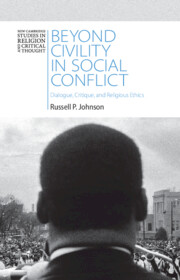Book contents
- Beyond Civility in Social Conflict
- Reviews
- Series page
- Beyond Civility in Social Conflict
- Copyright page
- Dedication
- Contents
- Acknowledgments
- Introduction
- 1 The Three Voices in the Ethics of Communication
- 2 The Rules Are Broken: Dilemmas of Restraint in War and Social Conflict
- 3 Integral Communication
- 4 Illusions and Indirect Communication
- 5 “Dynamically Aggressive”
- 6 Sharing the Good News
- Bibliography
- Index
5 - “Dynamically Aggressive”
The Rhetorical Force of Nonviolent Direct Action
Published online by Cambridge University Press: 08 November 2024
- Beyond Civility in Social Conflict
- Reviews
- Series page
- Beyond Civility in Social Conflict
- Copyright page
- Dedication
- Contents
- Acknowledgments
- Introduction
- 1 The Three Voices in the Ethics of Communication
- 2 The Rules Are Broken: Dilemmas of Restraint in War and Social Conflict
- 3 Integral Communication
- 4 Illusions and Indirect Communication
- 5 “Dynamically Aggressive”
- 6 Sharing the Good News
- Bibliography
- Index
Summary
Martin Luther King Jr. argues that means and ends must be commensurable. If one wants to bring about a more equitable society, one must do so by equitable means. This means-ends principle is reiterated in the writings of Gandhi and King, but it has often been treated as something mysterious. A pragmatic case can be made for it if we pay attention to the dynamics of communication. Gandhi and King argue for an approach to social conflict that combines compassion for the needs of their opponents with a resolute opposition to the injustices these opponents perpetrate. Respect and respectability without challenge and protest will not contribute to the development of a more equitable society. But neither will challenge and protest without respect and respectability. By attending to how nonviolent direct actionists combine these two pressures, I develop an alternative to the dominant perspectives in communication ethics, but one that shares their concerns for morality, effectiveness, and nonviolence.
Keywords
- Type
- Chapter
- Information
- Beyond Civility in Social ConflictDialogue, Critique, and Religious Ethics, pp. 212 - 277Publisher: Cambridge University PressPrint publication year: 2024

